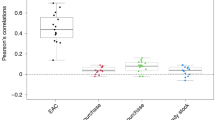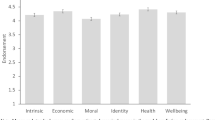Abstract
Inspired by the principles used to market physical products, campaigns to promote pro-environmental behaviour have increasingly emphasized self-interested (for example, economic) reasons for engaging with a self-transcendent cause (that is, protecting the environment)1,2. Yet, psychological evidence about values and behaviour suggests that giving self-interested reasons, rather than self-transcending reasons, to carry out a self-transcending action should be ineffective at increasing self-transcending behaviour more generally3,4. In other words, such a campaign may fail to cause spillover, or an increase in other, different environmental behaviours5. Here we show that recycling rates are dependent on the information participants receive about a separate environmental behaviour, car-sharing (carpooling in the USA). In two experiments, we found that recycling was significantly higher than control when participants received environmental information about car-sharing, but was no different from control when they received financial information or (in experiment 2) received both financial and environmental information. Our results suggest that, congruent with value theory, positive spillover from one environmental message to another behaviour (car-sharing to recycling) may occur primarily when self-transcending reasons alone are made salient.
This is a preview of subscription content, access via your institution
Access options
Subscribe to this journal
Receive 12 print issues and online access
$209.00 per year
only $17.42 per issue
Buy this article
- Purchase on SpringerLink
- Instant access to full article PDF
Prices may be subject to local taxes which are calculated during checkout


Similar content being viewed by others
References
Saving energy at home; available via http://go.nature.com/RfdjVw (2011).
Climate change—What You Can Do http://www.epa.gov/climatechange/wycd/ (2011).
Grouzet, F. M. E. et al. The structure of goal contents across 15 cultures. J. Pers. Soc. Psychol. 89, 800–816 (2005).
Schwartz, S. H. in Advances in Experimental Social Psychology Vol. 25 (ed. Zanna, M. P.) 1–65 (Academic, 1992).
Thøgersen, J. & Crompton, T. Simple and painless? The limitations of spillover in environmental campaigning. J. Consum. Pol. 32, 141–163 (2009).
Schwartz, S. H. & Rubel, T. Sex differences in value priorities: Cross-cultural and multimethod studies. J. Pers. Soc. Psychol. 89, 1010–1028 (2005).
Maio, G. R., Pakizeh, A., Cheung, W.Y. & Rees, K. J. Changing, priming, and acting on values: Effects via motivational relations in a circular model. J. Pers. Soc. Psychol. 97, 699–715 (2009).
Maio, G. R., Hahn, U., Frost, J-M. & Cheung, W-Y. Applying the value of equality unequally: Effects of value instantiations that vary in typicality. J. Pers. Soc. Psychol. 97, 598–614 (2009).
Verplanken, B. & Holland, R. W. Motivated decision making: Effects of activation and self-centrality of values on choices and behavior. J. Pers. Soc. Psychol. 82, 434–447 (2002).
Thøgersen, J. & Ölander, F. To what degree are environmentally beneficial choices reflective of a general conservation stance? Environ. Behav. 38, 550–569 (2006).
Ferguson, C. J. An effect size primer: A guide for clinicians and researchers. Prof. Psychol.-Res. Pr. 40, 532–538 (2009).
European Commission. Attitudes of European Citizens Towards the Environment Report No. 295/EB68.2 (2008); available via http://go.nature.com/LqYbCm.
Whitmarsh, L. Behavioral responses to climate change: Asymmetry of intentions and impact. J. Environ. Psychol. 29, 13–23 (2009).
Bem, D. J. in Advances in Experimental Social Psychology Vol. 6 (ed. Berkowitz, L.) 1–62 (Academic, 1972).
Burger, J. M. & Caldwell, D. F. The effects of monetary incentives and labeling on the foot-in-the-door effect: Evidence for a self-perception process. Basic Appl. Soc. Psych. 25, 235–241 (2003).
Cornelissen, G., Pandelaere, M., Warlop, L. & Dewitte, S. Positive cueing: Promoting sustainable consumer behavior by cueing common environmental behaviors as environmental. Int. J. Res. Mark. 25, 46–55 (2008).
Whitmarsh, L. & O’Neill, S. Green identity, green living? The role of pro-environmental self-edientity in determining consistency across diverse pro-environmental behaviours. J. Environ. Psychol. 30, 305–314 (2010).
Griskevicius, V., Tybur, J. M. & Van den Bergh, B. Going green to be seen: Status, reputation, and conspicuous conservation. J. Pers. Soc. Psychol. 98, 392–404 (2010).
Acknowledgements
We wish to thank D. Turetsky, D. Diamondstone and F. Harrell for their statistical advice.
Author information
Authors and Affiliations
Contributions
A.C., G.R.M., L.E. and U.H. designed experiment 1; A.C., C.J.H., G.R.M., L.E., S.A. and U.H. designed experiment 2. A.C., C.J.H. and L.E. carried out experiment 1 and analysed the data. S.A. carried out experiment 2; L.E. and S.A. analysed the data. L.E., G.R.M. and U.H. wrote the manuscript; all authors commented on the manuscript. G.R.M. and U.H. supervised the project.
Corresponding authors
Ethics declarations
Competing interests
The authors declare no competing financial interests.
Rights and permissions
About this article
Cite this article
Evans, L., Maio, G., Corner, A. et al. Self-interest and pro-environmental behaviour. Nature Clim Change 3, 122–125 (2013). https://doi.org/10.1038/nclimate1662
Received:
Accepted:
Published:
Issue Date:
DOI: https://doi.org/10.1038/nclimate1662
This article is cited by
-
Effects of matching climate change appeals to personal values
Scientific Reports (2024)
-
Willingness to Pay to Reduce the Ecological and Health Risks from Water Pollution in Emerging Urban Regions: The Case of the Red River Delta in Vietnam
Environmental Management (2023)
-
Motivations for participation in green crowdfunding: Evidence from the UK
Environment, Development and Sustainability (2023)
-
The Promise of Private-Sphere Pro-environmental Behavior as Climate Action
Current Climate Change Reports (2022)
-
Once you choose hope: early adoption of green technology
Environmental Science and Pollution Research (2020)



